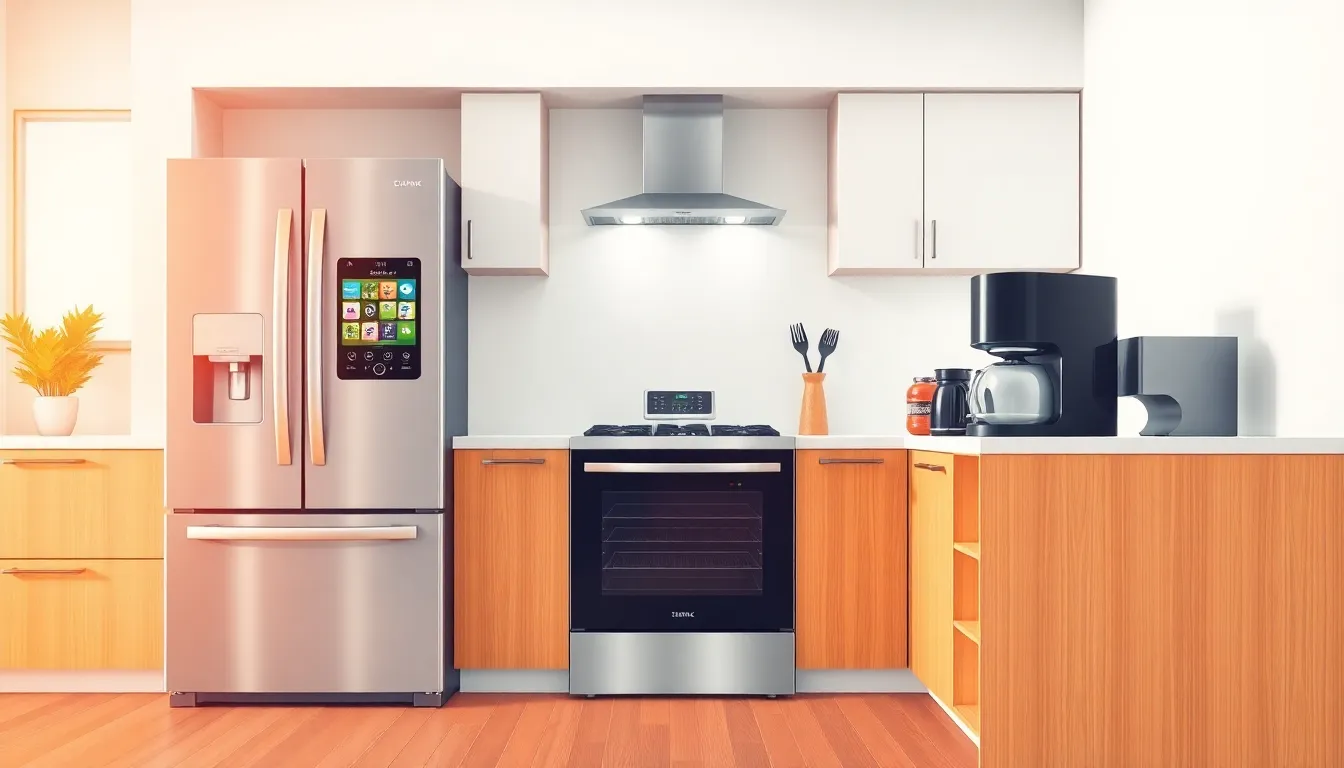Imagine a kitchen where the coffee brews itself while you’re still in bed, and dinner preps itself while you binge your favorite show. Welcome to the world of smart kitchen appliances, where technology meets culinary creativity. These gadgets don’t just chop and blend; they revolutionize the way meals come together, making cooking feel less like a chore and more like a fun adventure.
Table of Contents
ToggleOverview of Smart Kitchen Appliances
Smart kitchen appliances integrate advanced technology to streamline cooking tasks and enhance overall culinary experiences. These devices often connect to the internet, offering users control from smartphones or tablets.
Definition and Features
Smart kitchen appliances encompass devices like smart ovens, refrigerators, and coffee makers. Connectivity often enables remote monitoring and control. Voice assistants can integrate with many appliances, allowing users to issue commands hands-free. Features may include programmable settings for cooking times and temperatures. Additionally, some appliances offer smart sensors that adjust functions based on food type or quantity.
Benefits of Smart Kitchen Appliances
Convenience stands as a primary benefit of smart kitchen appliances, making meal preparation efficient. Automation reduces the time spent on repetitive tasks, freeing users to focus on creativity. Energy efficiency often accompanies smart appliances, leading to lower utility bills. Real-time monitoring helps prevent food waste, as notifications can remind users about expiration dates. Enhanced safety features provide peace of mind during cooking sessions.
Popular Smart Kitchen Appliances

Smart kitchen appliances offer innovative solutions that enhance everyday cooking experiences. These devices streamline meal preparation and optimize kitchen tasks.
Smart Refrigerators
Smart refrigerators revolutionize how users store and manage food. Equipped with touchscreen interfaces, they provide access to recipes, grocery lists, and inventory management. Some models feature cameras that scan contents, allowing users to check supplies from smartphones. Energy-efficient technology helps reduce electricity consumption. Notably, notifications alert owners when items approach expiration, minimizing food waste and ensuring freshness.
Smart Ovens
Smart ovens simplify cooking by utilizing advanced technology to achieve precise temperature control. Users can preheat ovens remotely, ensuring they are ready when needed. Voice assistant integration enables hands-free operation, allowing for seamless multitasking. Programmable cooking settings cater to various recipes and meal preferences. Furthermore, smart sensors detect food doneness, preventing overcooking or undercooking.
Smart Coffee Makers
Smart coffee makers elevate morning routines with user-friendly features. Many models allow scheduling brews and adjusting strength preferences via smartphone apps. Integration with voice commands enables effortless operation, from brewing to selecting custom settings. Coffee makers equipped with thermal carafes maintain optimal temperatures for extended enjoyment. Additionally, some devices can suggest recipes based on available coffee types or personal preferences.
How Smart Kitchen Appliances Work
Smart kitchen appliances operate through advanced technology that enhances cooking experiences. These devices seamlessly connect through the internet, allowing for convenient control and monitoring from smartphones or tablets.
Connectivity and IoT Integration
Connectivity forms the backbone of smart kitchen appliances. Devices connect to a home Wi-Fi network and utilize Internet of Things (IoT) protocols to communicate with each other. Through this integration, a smart oven can receive commands from a smartphone or receive updates on food preferences. This interconnectedness allows for real-time adjustments during cooking, ensuring optimal results. Users benefit from remote monitoring, enabling them to track energy use and receive alerts about inventory levels.
User Interfaces and Control
User interfaces vary among smart kitchen appliances, designed for ease of use. Many models include touchscreens that display menus and recipes, simplifying the cooking process. Voice assistant compatibility creates hands-free control, enabling users to interact without needing physical access. Applications for smartphones allow customization of settings, making meal preparation more efficient. With programmable features, recipes can be saved and recalled, optimizing meal planning. Such user-friendly designs enhance usability while contributing to modern kitchen automation.
Choosing the Right Smart Kitchen Appliances
Selecting the right smart kitchen appliances enhances the cooking experience and maximizes efficiency. Consideration of specific features and brands plays a significant role in this decision.
Factors to Consider
Budget dictates choices, influencing what features are available. Energy efficiency ratings often highlight which appliances save on utility bills. Compatibility with home networks enables seamless integration, allowing better control through smartphones. Size and design fit kitchens and complement aesthetics, ensuring appliances serve both function and style. Users benefit from reviews and ratings, helping them gauge performance and reliability based on real experiences.
Top Brands and Models
Bosch consistently ranks high with its sleek smart refrigerators, praised for energy efficiency and advanced inventory tracking. Whirlpool excels with innovative smart ovens that offer remote control and customizable cooking settings. KitchenAid provides versatile smart coffee makers, known for their brew scheduling and user-friendly apps. Samsung leads with high-tech refrigerators that feature touchscreen displays and built-in recipe assistance. GE Appliances attracts attention with its smart cooking products, focused on connectivity and ease of use.
Future Trends in Smart Kitchen Appliances
Exciting developments are on the way for smart kitchen appliances. Innovations are transforming how users approach cooking, making it more efficient and enjoyable.
Innovations on the Horizon
Voice-activated cooking assistants are becoming more prevalent, transforming meal preparation with hands-free convenience. Advanced AI is enhancing recipe recommendations, tailoring meals based on personal preferences and dietary restrictions. Adaptive interfaces are emerging in smart appliances, providing intuitive controls that learn user habits. Smart cooking devices are integrating with grocery delivery services, ensuring timely ingredient availability. Enhanced connectivity with home automation systems is leading to seamless interactions between kitchen appliances and other smart home devices.
Sustainability and Efficiency
Energy efficiency is a primary focus in upcoming smart kitchen appliances. Manufacturers are prioritizing sustainable materials and design practices, reducing environmental impact. Smart features like energy usage tracking help users monitor consumption in real time. These devices are designed to optimize energy during peak times or when in low-demand modes. Moreover, features that automatically adjust cooking times based on energy availability contribute to reduced waste. Water-saving technologies are also being incorporated, emphasizing eco-friendly practices in kitchen operations.
Smart kitchen appliances are revolutionizing the way people cook and manage their kitchens. With their advanced technology and seamless connectivity, these devices not only simplify cooking tasks but also enhance creativity and convenience. Users can enjoy the benefits of real-time monitoring and energy efficiency while embracing a more enjoyable culinary experience.
As technology continues to evolve, the future of smart kitchen appliances promises even greater innovations. From voice-activated assistants to AI-driven recipe suggestions, these gadgets are set to become indispensable in modern homes. By choosing the right appliances, individuals can optimize their cooking processes and create a more efficient and sustainable kitchen environment.





